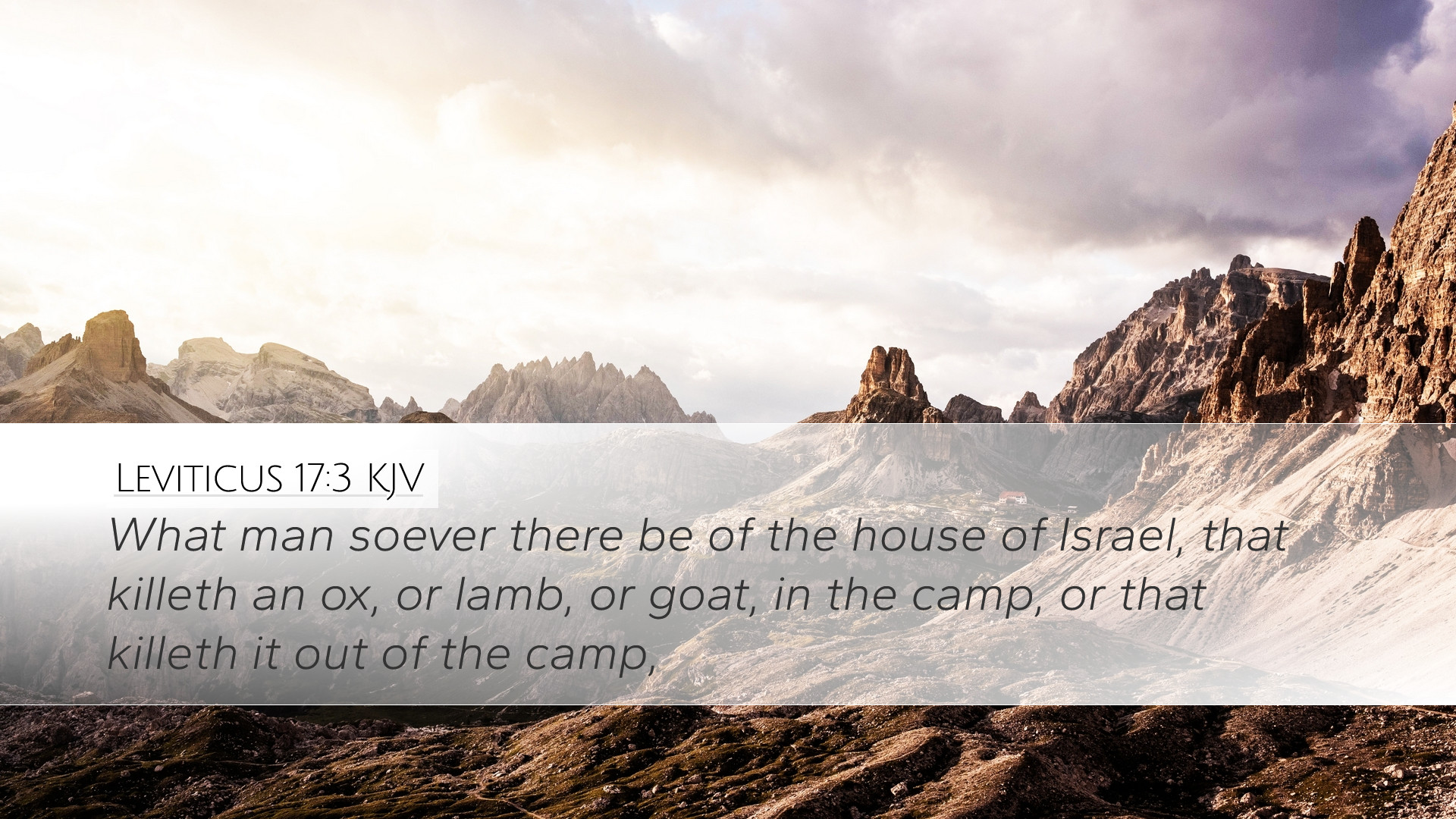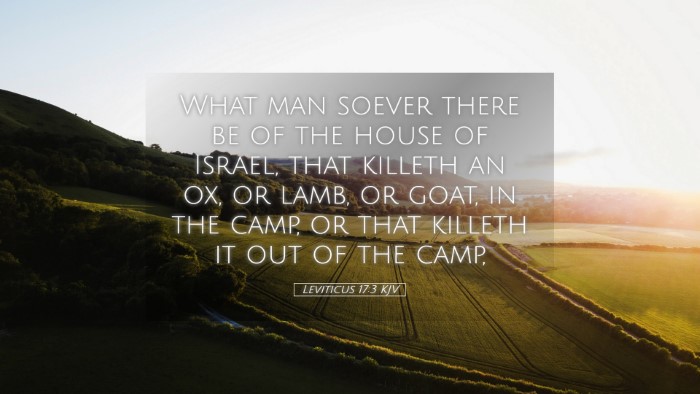Bible Commentary on Leviticus 17:3
Verse: "Any man of the house of Israel who kills an ox or a lamb or a goat in the camp, or who kills it outside the camp," (Leviticus 17:3, ESV)
Introduction
The book of Leviticus, often regarded as a manual for the priests and the people of Israel, provides a foundational understanding of holiness, clean and unclean, and the distinctions that set Israel apart as God's chosen people. Leviticus 17:3 specifically addresses the protocols surrounding animal sacrifices, an important aspect of Israel’s worship and community life.
Contextual Analysis
In the preceding chapters, God outlines various offerings and the proper means of performing them. Leviticus 17 serves as a transitional chapter focusing on the sanctity of the blood and the means of approaching God through sacrificial acts. This passage emphasizes the necessity of conducting sacrifices within the designated sanctuaries rather than privately or in an unauthorized manner.
Insights from Matthew Henry
Importance of the Blood: Matthew Henry highlights that this verse underscores the significance of blood in sacrificial practices. Blood represents life, and God's command regarding its treatment indicates His holiness and the seriousness with which He regards violations of His covenant.
Authority of the Sacrifice: Henry notes that prior to the formal establishment of the Levitical priesthood, sacrifices were often performed in various locations. This verse transitions to a stricter requirement for sacrificial acts, ensuring that they be conducted in conformity with divine will. It emphasizes the need for unity in worship and the acknowledgment of God’s chosen leaders.
Insights from Albert Barnes
Clarification of Sacrificial Norms: Albert Barnes elucidates that this verse reflects a movement towards centralization of worship. He posits that unauthorized sacrifices could lead to misunderstandings about the nature of worship and the authority of the priesthood.
Symbolism of Location: Barnes emphasizes that the location of sacrifice is not merely about physical space but also signifies the spiritual condition. Sacrifices conducted out of the appointed place could corrupt the worshipper’s understanding, leading to idolatrous practices. This centralization is meant to prevent such degradation.
Insights from Adam Clarke
Regulations to Maintain Order: Adam Clarke points out that regulations regarding where animals were to be sacrificed were critical for community coherence. By regulating these practices, the Israelites were reminded of their covenantal relationship with God and the seriousness of approaching Him in designated ways.
Worship and Community Identity: Clarke also argues that these laws served to reinforce the community's identity as a people set apart. The act of properly sacrificing was not just a ritual but an expression of allegiance to Yahweh, serving as a reminder of their deliverance and ongoing covenant responsibilities.
Theological Implications
The implications of Leviticus 17:3 extend beyond mere ritual observance. The strictures on where sacrifices could be made reflect God's desire for order, holiness, and dedication in worship. Each act of sacrifice was tied not only to the act of atonement but also to the larger narrative of God’s plan for redemption.
Role of Mediation: The role of the priest as a mediator between God and the people becomes a focal point in understanding this passage. This foreshadows the ultimate priestly role of Christ, who fulfills the sacrificial system by becoming the ultimate Passover lamb. The journey from the sacrificial norms of the Old Testament to the solitary offering of the New Testament underscores the transition to a new covenant.
Practical Applications for Today
- Understanding Worship: This verse serves as a reminder that our approach to God in worship must be reverent and aligned with His commands. Christians today must consider the posture of their hearts as they engage in corporate and individual worship.
- Community in Worship: The idea of communal worship and adhering to recognized leaders in faith underscores the importance of being rooted in a faith community. The local church should be a place of collective worship and instruction.
- Sacrifice in Modern Terms: Believers are called to present their bodies as living sacrifices (Romans 12:1), which requires a surrender to God's will that resonates deeply with the thoughts behind Leviticus 17:3. This encourages a life marked by intentionality and faithfulness to God’s commands.
Conclusion
In summary, Leviticus 17:3 provides profound insights into the nature of worship, the significance of blood, and the role of the priesthood, marking a critical juncture in understanding God’s intentions for His people. Through the amalgamation of historical context, commentary insights, and theological imperatives, we find a guiding principle that emphasizes the importance of a structured and reverent approach to worship that honors God and preserves community integrity.


